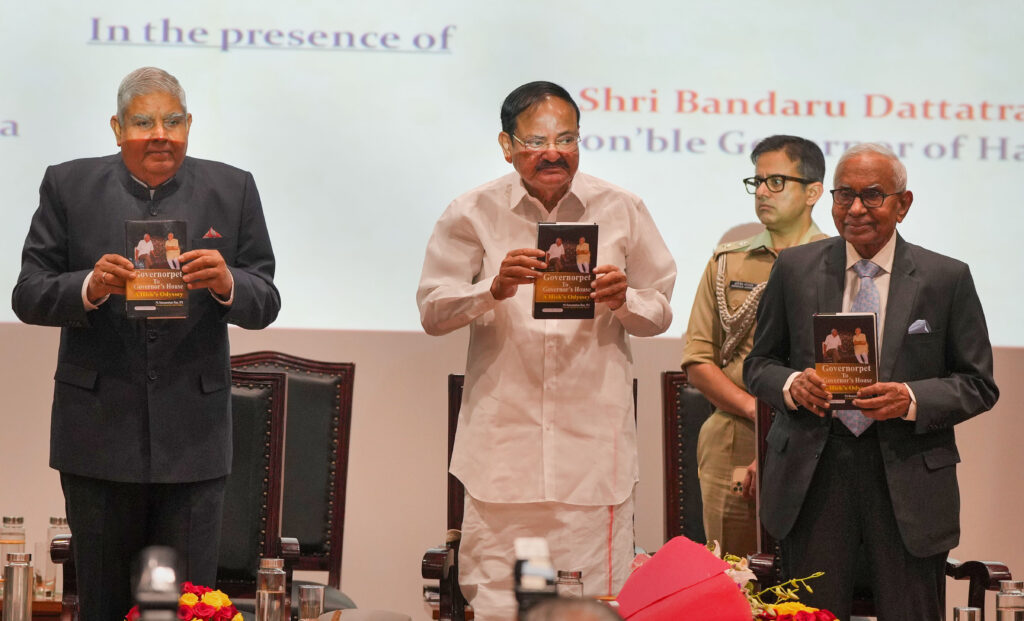Anti-India forces orchestrating pernicious narratives, need to neutralise such misadventures: VP Dhankhar
New Delhi, Mar 19 (PTI) Some “incubators and distributors” of anti-India forces are orchestrating “pernicious narratives” to trim the country’s growth trajectory and taint its functional democracy, Vice President Jagdeep Dhankhar said on Sunday, stressing the need to neutralise such “misadventures”.

Addressing an event here, Dhankhar’s predecessor M Venkaiah Naidu also flagged the issue and said “certain powers” outside the country are making such efforts as they are not happy with the growth and emergence of India.
Against the backdrop of a logjam in Parliament over Congress leader Rahul Gandhi’s recent remarks in the UK, the former vice president also called for smooth functioning of the proceedings of the Lok Sabha and the Rajya Sabha.
The responsibility to ensure smooth functioning of Parliament lies with both the ruling party and and the opposition, he added.
Both Dhankhar and his predecessor Naidu addressed the event organised to release a memoir of former Tamil Nadu governor P S Ramamohan Rao.
“India is on the rise as never before and the rise is unstoppable. Global relevance and recognition of the nation is at a level never seen before. This rise is with challenges…,” Dhankhar said.
“It is here that the intelligentsia and people from the media come into picture. We all need to be cognizant of the emergence of incubators and distributors of anti-Indian forces orchestrating pernicious narratives to downsize our growth trajectory and taint our functional democracy and constitutional institutions,” he said.
“It is imperative that we all believe in our nation and nationalism and engage in neutralizing such misadventures,” he added.
In a democracy, Dhankhar said, all are “similarly accountable” to law.
“No one can have privileged consideration by law, else democracy will cease to exist…You be as high, the law is always above you. It is known to us all that there can be no such privileges. There can be no enforcement of these privileges,” he said.
The rigors of law must apply to all, he said.
“Some people, unfortunately, think they are different or to be dealt with differently,” he added, without naming anyone.
India is the most vibrant and functional democracy, he said.
“Equality is something which we can never negotiate. Adherence to law is not optional. Some people have to realize it,” he added.
Addressing the event, Naidu said, “Some of the countries, who have a mindset of colonialism and who ruled us, ruined us, looted us and cheated us, they are not able to appreciate the growth and emergence of India.”
The former vice president said India is a vibrant democracy and people have freedom of expression in the country so much so that they can even criticise the prime minister.
“I feel Parliament should function. This responsibility does not lie with one party. Every party should help in proper functioning of the House,” he said.
“In the House, you can argue, criticise, tear the government into pieces by your arguments but you must allow the institution function. This responsibility lies on both the ruling and opposition parties. This should be kept in mind,” he added.
Comparing his term as a governor with that of former Tamil Nadu governor P S Ramamohan Rao whose memoir was released at the event, Dhankhar said, “While I did have privilege to have Mamata Banerjee ji as the chief minister, he also had a lady chief minister (J Jayalalithaa) who had a very strong personality.”
“We both had to deal with politicians of that calibre…We both could not complete our term for different reasons,” Dhankhar said,” adding Rao yielded to his conscience and did not cling to the office.
“We both acted with scrupulous, meticulous adherence to constitutional provisions. It takes a lot of courage to say after demitting office that there never was any occasion to deviate from the constitutional prescriptions,” he said.
“I was lucky. Naidu ji was mentor to many including me. I was getting constant guidance,” he said.
“A governor is required to address the Assembly…I have done it on three occasions. On all the three occasions, the chief minister was not sure whether I would be doing so or not. The chief minister may forget that I had people who could guide me, enlighten me, and (so) there could be no question of deviation,” he added.






